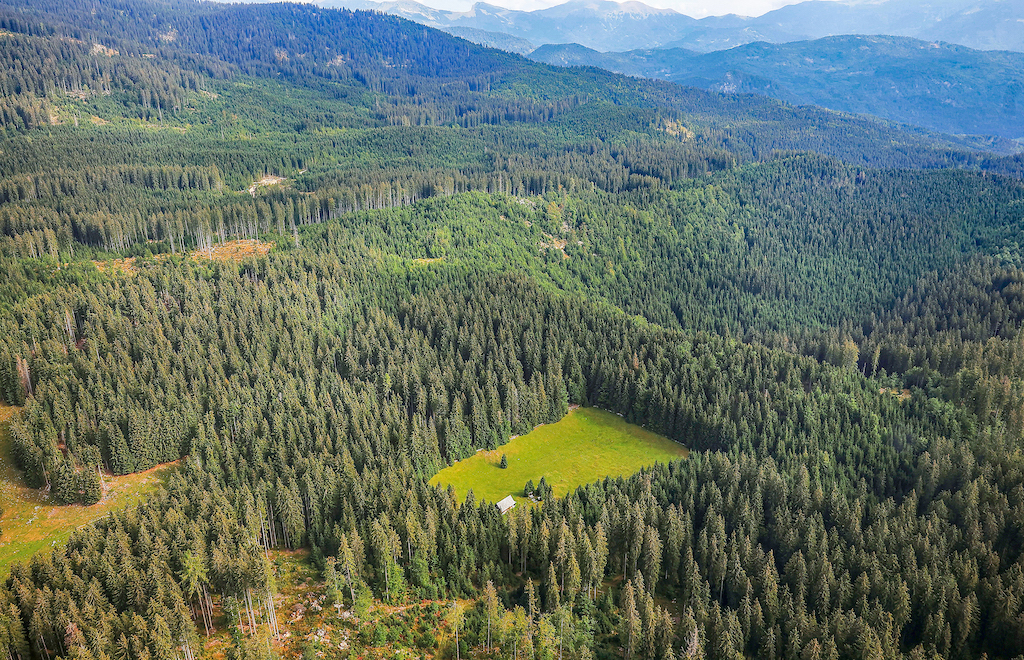By: Lea Kalc Furlanič
The Archdiocese of Ljubljana has approximately 22,100 hectares of forests, and they can cut approximately 118,000 net cubic meters of wood annually. But in the last six years, most of the available quantities of possible cuttings have been “eaten up” by the bark beetle.
What problems in forest management do they most often encounter and how are they solved? Franc Pogačnik, manager of the forests of the Archdiocese of Ljubljana, explains: “The biggest problem is the unification of management on our property throughout Slovenia due to the different approaches of the public forestry service – the Slovenian Forest Service. Another big problem is the low level of actual ownership due to ossified and outdated legislation.”
The forests were very overgrown
The forests, which the Archdiocese of Ljubljana got back in the denationalisation process, had to start changing them more intensively to a more natural state – to a mixture of forests, due to the large amount of spruce tree: “Unfortunately for all of us, foresters and owners, the sleet in 2014 overtook us and, as a result, there was a strong appearance of the bark beetle. In addition, we tried to improve the management system with less damage to the soil and stands, more modern technology, etc.”
Subsequently, they began to care for the forests more intensively, as well as to open them with forest paths. “Thus, in 2021 alone we invested more than 100,000 euros in a forest road in Jelovica, and in 2022 more than 150,000 euros in two roads in Pokljuka and one in Savinjska. The state helped us with this by co-financing through a tender (due to the public accessibility of forest roads). We will continue investing in this form in the coming years as well,” adds Pogačnik.
They inspected the returned forests, redefined their management and began to rehabilitate them, as they were affected by traps and attacked by bark beetles. Are they satisfied with the work they have done and what needs to be done? “We are not yet completely satisfied with the newly established method of management; we are all too limited by the constant pitfalls due to climate change and excessive silting of our (formerly national) forests. In addition, we want changes in the field of legislation, especially in terms of increasing property rights,” the manager points out. The company that manages the forests of the Archdiocese of Ljubljana is called Metropolitana.
Great nature conservation requirements
Managing the forests of the Archdiocese of Ljubljana is not easy, as they are on average above 1,000 meters above sea level (the plateaus of Jelovica, Pokljuka, Radovne na Gorenjskem, the slopes of Raduha, Dleskovška plateau, Menina mountain, Golte na Savinjskem), so the climatic conditions are a serious limiting factor. The same, or perhaps even greater, are increasingly severe nature conservation requirements and restrictions: more than 78 percent of all forests are in the Natura 2000 area, and just under 8,000 are in the Triglav National Park area, and in addition, their forests are home to many wild roosters and other habitats protected species. “We take all of this into account in our property management,” warns the interlocutor.
They give preference to selling wood at home
When asked what he thinks about the management of forests in Slovenia, whether it could be more effective and whether he defends the position of the Sloles association, that the state should better support the entire chain of production, processing, and use of wood with legislation, he answers: “Management or forest management in Slovenia should be significantly better due to such a large forest cover. Owners should be given more authority. Regarding the market of forest and wood assortments, the decision-makers should already think about this when concluding the European contract and make exceptions, as Austria did. Many small sawmills in Savinjska, which have found their processing niche in the fierce competition just across the border are a good proof that the wood industry can compete with foreign competition. However, the state, as the creator of a working and productive environment, could come to their aid significantly more and in this way support them even more. In this sense, the Archdiocese of Ljubljana has, in recent years, approached the preferential sale of wood on the domestic market, despite a lower price of a euro or more.”

